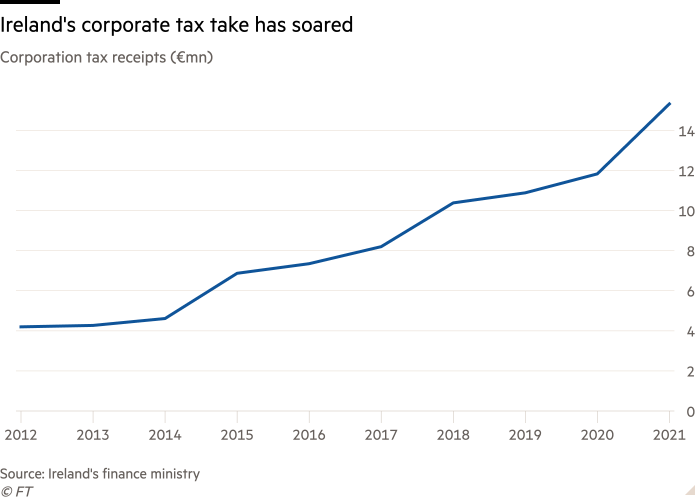For much of the EU, the economic outlook is grim with fears of a recession mounting and government finances constrained. Then there’s Ireland.
The republic is enjoying a €8bn corporate tax windfall after bumper pandemic-enhanced revenues from tech and pharmaceutical companies. The tax take from companies attracted by Ireland’s 12.5 per cent corporate rate has soared since 2015 and leapt a further 30 per cent last year compared with 2020.
Ireland’s economy expanded by 6.3 per cent over the second quarter, against an EU average of just 0.6 per cent. So great was the impact from multinationals that Ireland’s numbers distorted EU figures, despite the nation of 5.1mn making up less than 3 percent of the region’s economy.
With employment and foreign investment also at record highs, “the economy is even hotter than the weather,” said Danny McCoy, head of employers’ confederation, Ibec, noting recent record temperatures.
Yet Ireland is not without its problems. Prices rose by 9.1 percent in the year to June. Normal families feel priced out of the housing market in Dublin and other cities.
“We’re not on bad wages,” said Mark Murphy, 39, a regional manager at a charity, based with his wife in West Cork, who delayed getting married and starting a family to save for a “very modest” home around the €300,000 mark. “But now, the same houses are €400,000 — we just can’t get the credit.”
Consumer spending contracted by 1.3 percent in the first quarter compared to the previous three months. Modified domestic demand, a measure of the size of economic activity that excludes some multinationals’ expenditure and is considered a better indicator than GDP, fell by 1 percent over the first quarter.
Officials warn the corporate tax is vulnerable to fluctuation. Half of corporate tax receipts of €15.3bn last year came from just 10 companies — among them Apple, Google, Intel, Meta, Amazon and Pfizer.

But for now the healthy tax receipts give Ireland a handy cushion, with a very modest fiscal surplus expected if spending levels are maintained, although Ireland, following some EU neighbors including Spain, is now considering an extra tax on energy companies in the 2023 budget on September 27.
Dermot O’Leary, chief economist at brokerage Goodbody, said Ireland had no need to go down the “Robin Hood route” because it can use the corporate tax windfall to fund nearly €7bn of spending already announced for the budget.
Even after stripping out the multinational sector, Ireland’s domestic economy contracted less in 2020 and rebounded faster in 2021 than the EU average, rating agency DBRS Morningstar said.
Leo Varadkar, deputy prime minister, told an event last month to present record inward investment data: “The jobs and revenue created by multinationals helped to keep us out of recession when the pandemic hit and are now giving us the financial firepower to ease the cost of crisis living and avoid recession once again.”
But if the world economy experiences a downturn Ireland’s multinational sector could be its Achilles heel. The threat of a recession in the EU and US is mounting. Any downturn would hurt the profits of companies invested in Ireland and feed through into a lower tax issue.
The central bank said corporate tax receipts, which have exceeded expectations for the past seven years, were €8bn higher than expected last year and brought in nearly €9bn in the first half of this year alone.
The government has been reluctant to say whether or how it will use the tax windfall in the budget but the central bank and Irish Fiscal Advisory Council have warned over reliance on a tax issue that could prove volatile.
“There is nothing on the horizon that suggests that corporate tax revenues are going to fall rapidly,” said Seamus Coffey, a lecturer at University College Cork and an expert on corporate tax. “But five, six years ago, there was nothing on the horizon that suggested they were going to rise.”
John Fitzgerald, a Trinity College economics professor, says the worst-case scenario of a drastic drop in corporate tax receipts would be a loss of 3 to 4 percent of national income — a big hit to public finances.
Ibec cautioned that the Irish economy faced a “turning point”, and that “for Ireland, as a small open economy, shifts in the flow of capital through the global economy can have an outsized impact on our growth model”.
The central bank has also warned that construction of homes to tackle Ireland’s chronic housing shortage is flagging. Varadkar calls Ireland a “homeowning democracy” but think-tank the Economic and Social Research Institute recently forecast that one in three people now aged between 35 and 44 will not own a home by the time they retire.
Ireland could stay lucky. Although the government forecast that its decision to join an OECD global corporate tax accord setting a minimum 15 percent rate could cut revenues by €2bn, implementation has been delayed.
Foreign direct investment is continuing to surge, with the number of investments in the first half up 9 percent on the same period in 2021, including an 18 percent jump in new names locating in Ireland. Conall Mac Coille, chief economist at brokerage Davy, saw “no real reason” that taxes paid by foreign companies investing in Ireland would “collapse any time soon”.
For now, Ireland faces the problem of administering abundance. “We’re the equivalent of a household that just won the lottery,” said McCoy. “Are we the household mature enough to say ‘actually, this good fortune can be put to work for future generations’? Or are we just going to go daft for half this generation and have so much regret?”